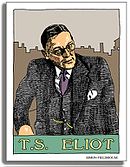The Sacred Wood is a collection of 20 essays by T. S. Eliot, first published in 1920. Topics include Eliot's opinions of many literary works and authors, including Shakespeare's play Hamlet, and the poets Dante and Blake.[1]
One of his most important prose works, "Tradition and the Individual Talent", which was originally published in two parts in The Egoist, is a part of The Sacred Wood.
The essay "Philip Massinger" contains the famous line (often misquoted) "Immature poets imitate, mature poets steal".[2]
References[edit]
- ^ Eliot, T. S. (10 July 1997). The Sacred Wood and Major Early Essays - Google Book Search. ISBN 9780486299365. Retrieved 2008-10-15.
- ^ "T. S. Eliot." Wikiquote, . 29 Oct 2015, 12:22 UTC. 21 Nov 2015, 22:51 <https://en.wikiquote.org/w/index.php?title=T._S._Eliot&oldid=2030414>

Well, that’s interesting to know that Psilotum nudum are known as whisk ferns. Psilotum nudum is the commoner species of the two. While the P. flaccidum is a rare species and is found in the tropical islands. Both the species are usually epiphytic in habit and grow upon tree ferns. These species may also be terrestrial and grow in humus or in the crevices of the rocks.
View the detailed Guide of Psilotum nudum: Detailed Study Of Psilotum Nudum (Whisk Fern), Classification, Anatomy, Reproduction